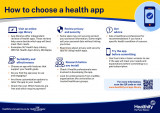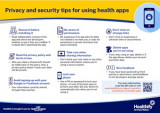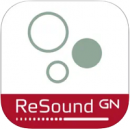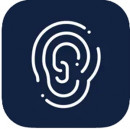If you're a frequent visitor to Healthify, why not share our site with a friend? Don't forget you can also browse Healthify without using your phone data.
Tinnitus apps
Key points about tinnitus apps
- Tinnitus apps often use sound therapy and cognitive behavioural therapy (CBT) approaches, which have been shown to be helpful for tinnitus.
- These apps are best used with guidance and input from your audiologist or other healthcare professional who specialises in tinnitus, as it's important to also have a medical assessment.

Tinnitus is hearing noise in your ears or head without a sound from the outside. It's commonly called “ringing in the ears,” but can include hearing different sounds such as buzzing, hissing, whistling, swooshing, and clicking. Tinnitus can be a temporary condition or an ongoing health condition. Learn more about tinnitus.
Tinnitus apps usually use sound therapy or cognitive behavioural therapy (CBT) to change your perception of or reaction to tinnitus, and they help with desensitisation and habituation to tinnitus sounds.
Sound therapy apps
Sound therapy uses external sound to change how you perceive or react to tinnitus. Research suggests sound therapy can effectively suppress tinnitus in some people. Sound therapy can work by masking the sound or distracting attention away from it, or by encouraging you to get used to the sound and not focus on it so much (habituation).
Sound therapy apps that use masking: These apps expose you to background sounds, like white noise, nature sounds, or ambient sounds, to mask tinnitus or distract attention away from it.
- Listening to sound machines or music through headphones or other devices can offer temporary breaks from your tinnitus. It's important to listen to these sounds at a low level (not loud).
- Household items like electric fans can also help overnight. In the daytime, listening to music, audiobooks or podcasts can be helpful.
- It's important to see your audiologist, as many people with tinnitus also have some degree of hearing loss and hearing aids can be very helpful. Hearing aids are the gold standard for helping with tinnitus as they can compensate for the hearing loss and they also have a masking effect as external sounds are brought to the foreground, often pushing tinnitus to the background. Hearing aids can also help with neural reorganisation (helping your brain to change and adapt to stimuli) which can help many people with tinnitus in the long term.
Sound therapy apps that use habituation: These apps work by training your brain to become more accustomed to tinnitus, and can reduce your brain's processing of the tinnitus signal. Here, you listen to sounds, initially for longer periods of time, and over time your brain changes how it processes the tinnitus sound and learns to ignore it.
It can be thought of in a similar way to how you eventually don’t think about the feeling of glasses on your nose. It's done with guidance from a specialist and the time frame varies per person. It's usually done over 12 to 24 months.
Cognitive behavioural therapy (CBT) apps
Cognitive behavioural therapy (CBT) is a tinnitus treatment that looks at your reaction to tinnitus. It doesn't aim to get rid of the tinnitus, but aims to reduce or correct your negative response to it.
- CBT aims to change negative thoughts or perceptions to more positive and realistic thoughts.
- In this way, you can function well despite having tinnitus. For some people, tinnitus will reduce over time due to managing emotion and attention to it, as this is key for habituation and desensitisation.
- People with tinnitus can develop an anxiety loop, where anxiety can be caused by the tinnitus, which in turn can make the tinnitus worse. CBT can help to manage the anxiety and break the anxiety loop.
- Read more about CBT apps.
Tips when using tinnitus apps
Do (✔)
- Talk with your healthcare provider about your specific situation. It's best to get guidance and input from an audiologist who specialises in tinnitus when you use a tinnitus app. A hearing, health and medical check by your audiologist, GP or ENT (ear, nose and throat) specialist is highly recommended.
- Apps can be helpful for access, anytime, to resources that help to mask or distract from tinnitus in the short term, and they can be helpful with assisting with neural reprogramming in the long term. Every person's experience is different, and symptoms as well as treatment options and what works, will vary widely from person to person. It's important not to rely on an app as your only source of information or to make a diagnosis.
- Exercise caution when using interactive features, such as discussion boards or group chat rooms where users can share their experiences. In most cases, these aren't monitored by a health professional so the advice or suggestions on them may not be safe or effective practice.
Don’t (✘)
- Don't rely on apps to make a diagnosis of your condition.
- Don't make changes to your treatment plan based on the recommendations from the app only. Always check with your healthcare provider.
It's best to get guidance and input from an audiologist who specialises in tinnitus when you use a tinnitus app. A hearing, health and medical check by your audiologist, GP or ENT (ear, nose and throat) specialist is highly recommended.
Tinnitus apps usually use sound therapy or cognitive behavioural therapy (CBT) to alter your perception of, or reaction to, tinnitus.
Before choosing an app, think about how it will benefit you and what you want it to be able to do.
- An app will only be helpful if you use it, so it needs to be something you like using and find easy to use.
- If you find the app difficult to use, or you don't like the imagery or look of it, or the language it uses, you may want to find another one that suits you better.
- Check how your data is collected, stored and used in the app, including whether it’s shared with or sold to third parties.
- For more guidance on how to choose health apps, see how to choose a health app(external link).
- It's important to remember that apps don’t replace professional help or your doctor’s advice.
| App | Features | Clinical review |
|---|---|---|
|
||
|
||
|
|
|
References
- Contemporary review of smartphone apps for tinnitus management and treatment(external link) Brain Sci 2020;10(11):867.
- Smartphone apps in the context of tinnitus – systematic review(external link) Sensors (Basel) 2020;20(6):1725.
|
Disclaimer: The NZ Health App Library is a free consumer service to help you decide whether a health app would be suitable for you. Our review process is independent. We have no relationship with the app developers or companies and no responsibility for the service they provide. This means that if you have an issue with one of the apps we have reviewed, you will need to contact the app developer or company directly. |
Factsheets – using health apps safely

How to choose a health app
Healthify He Puna Waiora, NZ

Privacy and security tips for using health apps
Healthify He Puna Waiora, NZ
Credits: Healthify editorial team. Healthify is brought to you by Health Navigator Charitable Trust.





